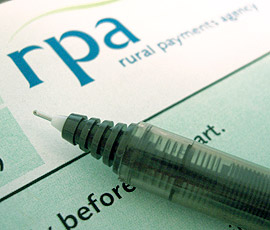Farmers Weekly launches broadband campaign

Battling for Broadband is a Farmers Weekly campaign to improve access to broadband for rural people and businesses by pressing government to keep its promises and by raising awareness of the problems a lack of broadband causes
We’ll be looking at the positives and negatives of different methods farmers are using to get a good broadband connection.
Campaign aims
- To hold the government to its promise of broadband for all by 2015
- No compulsory reporting or online filing until everyone has broadband access at speeds which allow them to meet these requirements. Alternatively, the government should offer financial help to those without broadband to cover the extra costs of meeting compulsory online filing requirements until broadband access is available
- To identify and explain practical alternatives to conventional landline broadband
Impacts of poor broadband access
It is estimated that two million people in the UK have poor broadband access and a further 166,000 cannot get broadband access at all. These people are almost all in rural areas.
Not having a suitable broadband connection in 2012 causes a huge range of problems for farmers, not only in compulsory online filing of VAT and other government forms but also in keeping up with market information and trends, making payments, communicating socially and diversifying.
In 2007 DEFRA identified lack of adequate broadband as one of the key barriers to farm diversification, and little has changed for farmers in the five years since then.
Broadband facts
- Mbps, or megabits per second, is the unit used to measure broadband speed
- The average UK broadband speed is 7.6Mbps. At this speed, it takes roughly five seconds to download a music track
- The UK ranks 25th in the EU for average speed
- The worldwide average is 5.8Mbps and the fastest average broadband in the world is 22Mbps in South Korea
What is being done to improve access
Internet service providers argue that it is not economical to install the cables or exchanges required for a standard ADSL connection in rural areas and even those who have the infrastructure suffer from poor-quality copper wiring and degradation, meaning the speeds achieved by farmers are often slower than those advertised.
The government has pledged to provide £530m to ensure 90% of households in the UK have superfast broadband (24Mbps) by 2015. This money will also cover getting the remainder of households up to 2Mbps. Responsibility for this rollout has been given to local authorities.
Broadband access is now essential for farmers. Those who do not have access increasingly find that running their business costs more in time and money.
Online forms
Government departments have already begun moving compulsory forms online and with the introduction of real-time reporting for PAYE, it will be very difficult to run a farm with a poor connection, according to NFU tax adviser Michael Parker. “This is the case particularly where you have the issue of a connection cutting out. If this happens while your filing PAYE, it will mean you won’t be able to pay your employees until the connection returns,” he said.

Julia Blant and her family know all about connections cutting out. She said they struggle to fill in even the most basic forms for their Nottinghamshire pig business. Their connection speed averages at 0.5Mbps and frequently cuts out – once for more than a week.
“BT have sorted the problem of the connection cutting out but the speeds are still unworkable,” she said. “Part of our problem is that we’re at the end of a very long copper wire and BT won’t fork out to upgrade it to optical fibre.
“It makes it harder to keep on top of things in the pig industry. Even basic things like watching a video are so difficult.
“It can be unbearable sometimes. We filled in the first movement licence online recently and it took three times as long as the paper copy. It was half an hour of messing about when we can do the paper ones quite quickly.
“You can no longer order stationery for the P11 PAYE forms, you now have to download everything.
“The problem isn’t with money but time and stress.
“All the government departments are doing this and they haven’t even thought about us. It’s not being realistic. We haven’t got everything online because it’s very, very annoying not having the speed or reliability.
“Our farm secretary considers us to be quite ‘with it’ so I dread to think the sorts of problems others are having.”
A farm secretary or administrator can take forms elsewhere to complete online. The Institute of Agricultural Secretaries & Administrators can find a registered farm administrator in your area.
Slow connection
For James Henderson, a farmer who also runs 25 office units in Aylesbury, Buckinghamshire, the speeds he was getting with BT through ADSL made it very difficult to diversify as they were not good enough for the businesses who rent the offices.
“The connection we had was so slow,” said Mr Henderson.
“Typically we were looking at 1.5Mbps and BT were not interested in providing us with a better connection. They’d rather make more money from Milton Keynes [the nearest town].”
“In the end, we had to get a wireless connection through a local supplier, which is good but could still be better. We’re now getting speeds of 6MBps, which is a vast improvement.
“It’s not so much the cost, the frustration comes as it is a basic necessity which we cannot live without.”
Key players in the campaign
Who are currently the key players campaigning for better broadband and what are they saying?
Country Land & Business Association
“Since 2002, the CLA has been instrumental in lobbying both government and industry in recognising the negative economic and social impacts of the rural-urban digital divide. The CLA is currently pushing for a legal Universal Service Obligation that will guarantee the countryside a minimum connection of 2Mbps.”
NFU
“Our current priorities for rural broadband work are: encouraging members to set up local networks, seeking a model wayleave agreement, ensuring there is government funding to help all rural communities and that government departments take account of rural areas when considering measures that require a good internet connection.”
Countryside Alliance
“In late 2010, the Countryside Alliance used the Freedom of Information Act to find out that almost no progress was being made on pilot projects for super-fast broadband. The CA’s resulting “name and shame” on this prompted a time limit on the councils involved. We continue to keep that pressure on.”
National Federation of Young Farmers Clubs
“Rural communities cannot function adequately either in business or socially if there is not adequate provision of technology. There needs to be parity in services between rural and urban environments. Lack of rural availability is a barrier to business set up and expansion and thus detrimental for the future rural economy. Poor mobile phone reception also contributes to the last point and can be a potential health and safety issue in regard of lone workers.”
| What are farmers required to do online? | |
|---|---|
| 2011 | PAYE Since April 2011, employer annual returns (P35 and P14s) must be filed online by 19 May each year. Starter and leaver forms must also be filed online since this date. Companies Since 1 April 2011, companies must submit returns online and pay tax electronically. |
| 2012 | VAT From April 2012, all VAT-registered businesses must submit VAT returns online and pay any VAT due electronically. Since April 2010 anyone with turnover of more than £100,000 or registering a new business must submit VAT returns online and pay any VAT due electronically. Pig movement records From April 2012, to comply with the Pigs Records, Identification and Movement Orders (PRIMO) 2011, pig movements must be reported electronically through the eAML2 system. Those without internet access can contact the eAML2 Bureau Service to have the online movement set up. There will also be third party providers. |
| 2013 | PAYE – Real Time Information (RTI) From October 2013, all employers must report PAYE tax, NI, leavers and starters electronically with each payroll run rather than at the year end. Pilot starts April 2012 for a year, early adopters join in October this year. RTI goes live from April 2013. |
| 2015 | SPS claims It is possible that from 2015 SPS claims will have to be made online. In 2011, electronic claims were made by 31,000 out of the total of 105,000 claimants. |
Case study
Edwina Spicer is a sheep and arable farmer and freelance farm administrator in Tunworth, Hampshire. Her family is unable to get broadband and she is forced to do a 14-mile round trip to file her paperwork at a library.
“Half our village can get broadband but unfortunately we’re in the half that cannot. It can be incredibly frustrating trying to get online forms filed in time.
“Filling in forms online is frustrating”
“The number of things we need to do online means going to the library every week. I tend to try to work it around other things I’m doing but it must be very difficult for those who live much further from libraries.
“The library is a fabulous resource for me but it means doing everything in 20-minute slots and carrying a folder with all the information I need. It’s a real nuisance when you get all the way to the library and realise you’ve forgotten something.
“I have to ensure I make a list of the things I need to do online as I go along but not having immediate access is annoying when you just have a query.
“Plus, it costs us more in transport, not only in petrol but in parking as well. And of course there’s the time it takes, too.
“I can see why people don’t like filing personal information in a public place. I doubt anyone is looking over my shoulder while I’m doing it, but I suppose for a lot of people that’s the concern.
“At the moment it’s very inconvenient but workable, but things will only get worse for farmers with more and more things moving online.”
